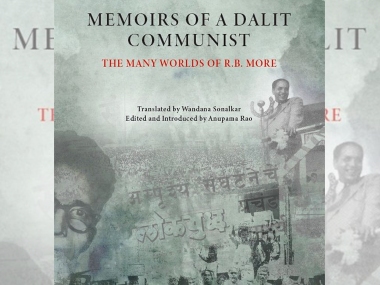At first glance, the book Memoirs of a Dalit Communist - The Many Worlds of RB More, published by LeftWord (a Communist publisher) can seem interesting, even enticing. But those who have read about and are aware of the history of identity politics within the Indian Communist movement will know that such a title does a disservice to the life of its subject, Ramachandra Babaji More. Moreover, the book has been co-authored by More and his son Satyendra, and neither of them have been credited on the cover. The name of the Savarna translator and editor do, however, find mention. The real politics can be found inside the book, where the experiences of a Dalit who stood against caste all his life, even after making an ideological shift to Communism, have been laid out. Foremost, this book should be read for the explanations it offers for the failure of Communism in India, in particular the ideology’s unsuitability to the social reality of Indian politics. The book is also a critical read because it lays bare how Savarna leaders used caste to their advantage within Communist groups. In his early years, More appears to be a Mahar boy who was always in the quest for learning. Born in the Ladawali village in the Raigad district of Maharashtra, his dire circumstances and social location did not deter him from pursuing a life of intellectualism and an eternal longing for justice. His ideology seems to have been shaped by how two elements – water and education – affected his childhood. He played an instrumental role in the Mahad Satyagraha of 1927 led by Babasaheb Ambedkar, by organising people – a fact acknowledged by few today.
More lived many lives, but the one that was most critical was being among the first Mahar figures in the Indian Communist movement – a bridge between Ambedkar and Communism.
His participation in the Communist movement served as a reminder to his peers to question caste, including their own caste privileges. In the latter half of the book, written by his son Satyendra, we learn about More’s ideological shift but do not find any detailed explanations for it. Throughout his life, untouchability remained More’s focus. “Untouchability has been practised in India for hundreds of years. But since it is an injustice, a kind of oppression, a form of slavery, the enemies of the untouchables have always taken care that it should not be spoken of, that it should not be openly discussed," he wrote. He wrote three memorandums in this regard to the Communist party, which were left unattended for 15 years. When Com. BT Randive, Com. Sanzgiri and Namboodiriprasad wrote articles on caste, they borrowed many arguments from these memorandums. Memoirs of a Dalit Communist asks us to seriously consider two questions: why were these memorandums in question not treated as a priority? And why did Savarna writers borrow from them for their own scholarship? The book meditates on the limitations of Marxist thought when applied to India, due to its emphasis on the unity of the exploited rooted in class. If this was a viable solution, the Khairlanji massacre would not have taken place. The Marichjhapi massacre too, where thousands of Namasudras (untouchables) were killed, raped and made to starve to death under a Communist government’s rule, would not have taken place. At its essence, Memoirs of a Dalit Communist exposes the limitations of a revolution shaped by Savarna hands. *** Yogesh Maitreya is a poet, translator and founder of Panther’s Paw Publication, an anti-caste publishing house. He is pursuing a PhD at the Tata Institute of Social Sciences, Mumbai.


)
)
)
)
)
)
)
)
)



